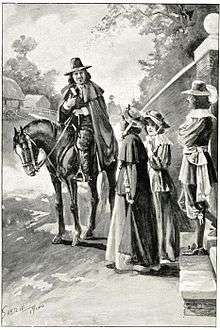Agnes Beaumont
| Agnes Beaumont | |
|---|---|
 much later illustration of her and John Bunyan | |
| Born |
Baptised 1652 Edworth |
| Died | 1720 |
| Nationality | UK |
Agnes Beaumont (Baptised 1652 – 1720) was a British religious autobiographer who was accused to conspiring with John Bunyan to murder her father. She wrote an autobiography that dealt with this event and her alleged sexual relationship with the preacher John Bunyan.
Life
Beaumont was born in Edworth near Biggleswade and she was baptised in 1652.[1] Her parents were John and Mary Beaumont of Pirton.[2]
Beaumont's family did not follow the established Christian denomination of Anglicanism so it was unsurprising when she joined a church in Gamlingay led by the evangelist John Bunyan. However her father did not approve and forbade her to get involved. Agnes was given a lift by Bunyan and rode pillion on his horse. She conceded to his father's command only after she had been thrown out of the family home for two days. This all became notable when her father died the following night. A heart attack is a possible cause of death but one of her former boyfriends alleged that she had poisoned her father. This was a capital offence and Beaumont was found to be not involved by the coroner and his jury. She had escaped being potentially burnt at the stake but rumours abounded that she and Bunyan had been lovers. Her accuser was a lawyer named Feery. The next year he spread a rumour that she had set fire to a house.[2] The rumours of her sexual relationship continued and Bunyan was still having to deny them in later editions of his autobiography.[3] She wrote her account of this in about 1674.[1]
Beaumont married Thomas Warren of Cheshunt in 1702. He died in 1707 and the following year she married Samuel Storey who was a prosperous fishmonger, but she still owned half of her husband's land in Cheshunt.[2] She died on 28 November 1720 and she was buried at Tilehouse Street Baptist chapel in Hitchin.[4] This was her church and one that she had helped to pay for. Samuel Storey survived her.[2]
Legacy
An autobiography that dealt with the events surrounding the accusations made against her and John Bunyan was in circulation in the 1760s. The account was titles, An Abstract of the Gracious Dealings of God with Several Eminent Christians in their Conversions and Sufferings and had additional text by Samuel James.[1]
In 1812 a plaque was placed on Tile House Baptist church to record that she was a member of the church under the guidance of John Bunyan.[4]
In 1901 Beaumont was appearing in a book of girl heroines.[5]
Beaumont's autobiography, "The Narrative of the Persecution of Agnes Beaumont", is in the British Museum.[4]
References
- 1 2 3 Agnes Beaumont, Orlando Project, Retrieved 10 May 2017
- 1 2 3 4 W. R. Owens, ‘Beaumont, Agnes (bap. 1652, d. 1720)’, Oxford Dictionary of National Biography, Oxford University Press, 2004 accessed 10 May 2017
- ↑ Grace Abounding to the Chief of Sinners (1666), later editions, John Bunyan
- 1 2 3 Agnes Beaumont, Tile House Baptist Church, Retrieved 10 May 2017
- ↑ Agnes Beaumont, True Stories of Girl Heroines, 1901